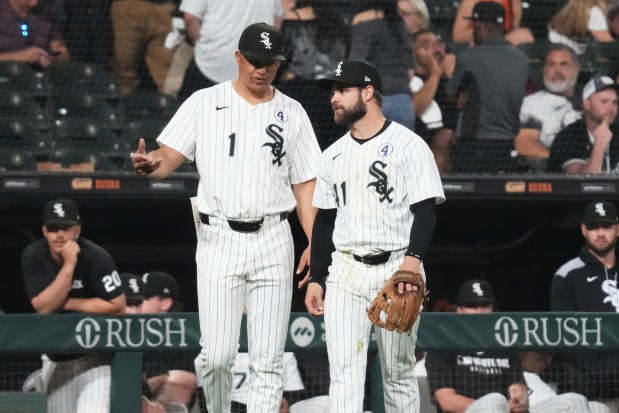A cloud of cruelty hangs over so much of our discourse right now, dulling our spirits and conjuring our worst instincts.
I don’t blame anyone for tuning it all out and calling a friend or staring at some art or binge watching something hopeful. (“Shrinking” is fantastic.) Anything that reminds us why we’re here, which is to love and be loved and help people and laugh and be awed by beauty and put more of it into the world when we can.
Sex and advice columnist Dan Savage said it better than I could, on a late January episode of his podcast, “Savage Love.”
“Anyone who tells you that making time for joy is a distraction or a betrayal has no idea what they’re talking about,” Savage said. “During the darkest days of the AIDS crisis, we buried our friends in the morning, we protested in the afternoon and we danced all night. And it was the dance that kept us in the fight because it was the dance we were fighting for.”
Fight to protect what’s precious. But don’t neglect what’s precious in the process.
So today I’m fighting Tommy Tuberville.
In between calling a friend and staring at some art and finishing Season Two of “Shrinking,” I tuned in to Robert F. Kennedy Jr.’s confirmation hearings and was dismayed to hear Tuberville, the Republican senator from Alabama, reminiscing about corporal punishment.
“We have an attention deficit problem in this country,” Tuberville said. “You know, attention deficit, when you and I were growing up, our parents didn’t use a drug. They used a belt and whipped our butt, you know, and told us, ‘sit down.’”
The cruelty cloud.
In his remarks to Kennedy, Tuberville was lamenting what he believes is an overreliance on medications prescribed to treat attention-deficit/hyperactivity disorder. Only he lost all credibility when he conjured, almost nostalgically, an image of a grown-up using a belt to whip a struggling child.
“It goes contrary to everything we know in terms of children’s development,” said psychiatrist and author Paul Holinger.
I called Holinger to talk about Tuberville because Holinger is a vocal and consistent advocate for children’s right to safety from physical punishment. In his most recent book, “Affects, Cognition, and Language as Foundations of Human Development,” Holinger calls physical punishment “the canary in the coal mine” because its devastating consequences so clearly illustrate the lasting impact of early childhood experiences.
“Hitting a child elicits precisely the negative effects a parent, caretaker or other abuser does not want to generate in a child,” Holinger writes. “Distress, anger, fear, shame, disgust.”
A massive body of literature spanning several decades links physical punishment with all of the following, Holinger writes:
More antisocial behavior and delinquency as a child and young adult. More impulsiveness. Less self-control. More risky sexual behaviors as a teenager. More crime perpetrated as an adult. More drug abuse. A high probability of depression. More violence against marital, cohabitating and dating partners. More violence against non-family members.
And yet. Corporal punishment in schools is still legal in 17 states and practiced in 14, according to the National Education Association, and Black students are four times more likely than white students to experience it.
“Think about it this way,” Holinger said. “If it’s in school, it’s OK to hit a kid with a paddle. If you go 10 feet away from that school, that paddle is a weapon and the person can be accused of assault and battery. What are we thinking?”
Similarly, if an adult pulls out a belt and starts to whip their spouse, it’s a crime. But if that same adult whips their (much smaller, defenseless, terrified and still developing) child, it’s a throwback to a simpler time?
No. It’s a betrayal of your role as a parent, which is to protect your child from violence, to steer them away from harm, and to guide them to the knowledge and skills and tools they need to keep themselves safe and healthy when you’re not by their side. Whipping them with a belt does none of these things.
Sixty-seven countries have banned physical punishment altogether — in any setting.
“Legislation alone will not protect children,” UNICEF wrote in a statement announcing Tajikistan’s recent ban. “However, legal bans have been shown to be a critical first step in ending corporal punishment. They raise awareness of its negative impact and send a clear message that hurting children, for any reason, is never acceptable.”
I wish Tuberville had offered an addendum to his comments. Something along the lines of “… and thankfully we now know better than to resort to violence against children.”
But he didn’t. So I’ll pass along this one, from an article in ADDitude magazine headlined, “ADHD Is an Actual Condition. You Can’t Beat It Out of a Child.”
“The effects of ADHD crush families, multiply health burdens, sap worker productivity and increase penal system costs,” family physician Oren Mason told the magazine. “People with ADHD and similar mental health challenges need affordable and available medications, psychosocial support, and education/work modifications. Parents need evidence-based guidance and training opportunities and respite. Teachers need evidence-based methodologies and the time to implement them. Therapists and coaches need training in the most beneficial interventions. Scientists and researchers need funding and priority-setting leadership.”
And children need grown-ups who don’t aggrandize violence against our most treasured, and tender, assets.
Join the Heidi Stevens Balancing Act Facebook group, where she continues the conversation around her columns and hosts occasional live chats.
Twitter @heidistevens13



